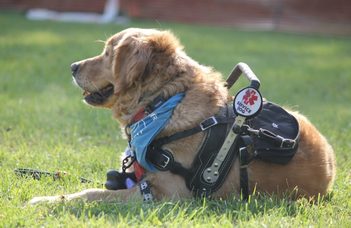Assistance and therapy dogs are better problem solvers

The special training of assistance and therapy dogs to actively help people favor their independent and more successful problem-solving performance, but the general training of pet dogs also increases persistence.

Research comparing wolves and dogs often suggested that domestication made dogs “dumb” for solving physical tasks. While wolves spent more time manipulating an apparatus and were thus more successful in solving the problem, dogs used more social strategies such as gazing at the human face, which could be interpreted as asking for help from their human partner. However, performance is affected by other factors as well, such as the relationship with the owner, motivation, and persistence. Dogs with training experience (i.e., agility, police, search and rescue, and man-trailing) have been found also more successful in problem-solving tasks and looked less to people than untrained dogs. But in these studies, the dogs differed in the types of training they received and their everyday experiences. Thus, to disentangle the relative effects of training for recreational purposes and specific work, animal behavior researchers have now compared the performance of dogs trained for assistance and therapy work with family dogs which had been trained for recreational purposes and found that working assistance and therapy dogs were more independent problem solvers compared to both trained and untrained family dogs, who privileged a more social strategy.
The team, led by scientists from the ELTE Eötvös University, Hungary, investigated a total of 90 dogs between 1 and 12 years of age, of different breeds and mixed-breeds, living in all families. 30 untrained dogs had no certification exams, 30 dogs were trained for recreational purposes, and 30 dogs worked as certified assistance or therapy dogs. Assistance dogs were trained to aid individuals with disabilities by the Dogs for Human charity (http://kea-net.hu/). The study was published in Frontiers in Veterinary Sciences.
“Dogs used different behavioral strategies when we gave them a commercial dog toy with food pellets hidden inside. If they were motivated to obtain rewards, they either tried to solve the problem on their own or tended to interact with a human partner. Working assistance and therapy dogs found 3 pellets on average out of 8, while untrained dogs have not found any. Instead, they looked twice as long at the owner” said Fabricio Carballo, guest researcher at ELTE from CONICET, Argentina. Márta Gácsi, who is not just a researcher but a certified assistance dog trainer, added that “Importantly, training experiences (mainly obedience and agility in this study) also increased the independent problem-solving tendency in our task, suggesting that trained family dogs generalize their training experience of facing novel situations and perseverance for obtaining rewards”.
Nevertheless, training for recreational purposes did not seem to be enough for dogs to reach the effectiveness of working assistance and therapy dogs, as the latter were more successful problem solvers. “This result suggests that dogs’ everyday experience is an uttermost important aspect to take into account when assessing their skills in a problem-solving situation. Working dogs were probably more comfortable in the presence of strangers and in novel situations given that they usually accompany their owners to a variety of places.” Concludes Enikő Kubinyi, the leading author of the study. “But we also cannot exclude that working dogs had pre-existing characteristics that distinguished them from other dogs, for instance, they are innately bolder and trainable than other dogs. All in all, although assistance and therapy dogs need to show highly developed social understanding in their interactions with the owner, their special training and work also increase their persistence and independent problem-solving skills.”
Reference: Carballo, F., Cavalli, C.M., Gácsi, M., Miklósi, Á. and Kubinyi, E. (2020). Assistance and therapy dogs are better problem solvers than both trained and untrained family dogs. Frontiers in Veterinary Science, doi: 10.3389/fvets.2020.00164. https://www.frontiersin.org/articles/10.3389/fvets.2020.00164/full

